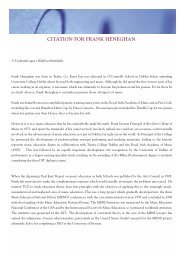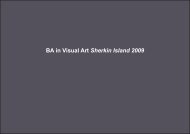TWICE THE SIZE - DIT Update - Dublin Institute of Technology
TWICE THE SIZE - DIT Update - Dublin Institute of Technology
TWICE THE SIZE - DIT Update - Dublin Institute of Technology
You also want an ePaper? Increase the reach of your titles
YUMPU automatically turns print PDFs into web optimized ePapers that Google loves.
Traditional Planning Futures Approach<br />
Perspective Partial, ‘everything else being<br />
equal’<br />
Overall, ‘nothing else being equal’<br />
Variables Quantitative, objective, known Qualitative, subjective, hidden<br />
Relationship Statistical, stable structures Dynamic, emerging structures<br />
Explanation The past explains the present The future is the raison d’etre <strong>of</strong> the<br />
present.<br />
Picture <strong>of</strong> Future Simple and certain Multiple and uncertain<br />
Method Deterministic and quantitative Qualitative, behavioural and<br />
models<br />
stochastic models<br />
Attitude to the Passive or adaptive (the future Active and creative (the future is<br />
future<br />
will be)<br />
shaped)<br />
Table 1: Traditional planning versus futures approach (Lindgren & Bandhold, 2003).<br />
2.2 Methodology <strong>of</strong> the study<br />
The process <strong>of</strong> imagineering the future <strong>of</strong> cities and regions can be described in three main<br />
phases:<br />
1. Strategic Thinking<br />
2. Strategic Planning<br />
3. Strategic Implementation<br />
This study focuses on the Strategic Thinking Phase, which can also be called the Visioning<br />
Phase. The overall methodology for this project was based on the Prospective Through Scenarios<br />
process, which is a systematic, rigorous futures methodology that enables the exploration <strong>of</strong><br />
possible future alternatives and the identification <strong>of</strong> preferred future options. The methodology<br />
has successfully been applied in a number <strong>of</strong> projects carried out by the Futures Academy 3 over<br />
recent years.<br />
This section discusses the details <strong>of</strong> the methodological framework for this study. First the<br />
overall futures approach – Prospective Through Scenarios Process - is discussed in detail. Then<br />
the main methods and techniques, and the tasks they were used to complete, are presented.<br />
Finally, the issues related to the facilitation <strong>of</strong> collaborative stakeholders are considered.<br />
3 Imagine Lincoln 2020 (2005), <strong>Dublin</strong> 2020 Vision for the <strong>Dublin</strong> Chamber <strong>of</strong> Commerce (2004), The<br />
Bratislava Raca Prospective - Towards a Preferred Future (2004), Development <strong>of</strong> Future Scenarios for<br />
<strong>Dublin</strong>-Belfast Economic Corridor (2003).<br />
29








